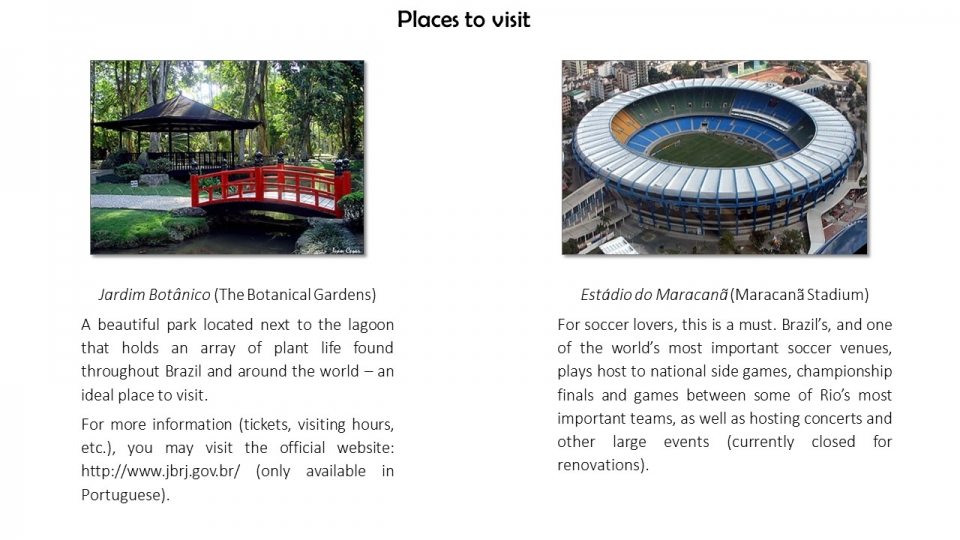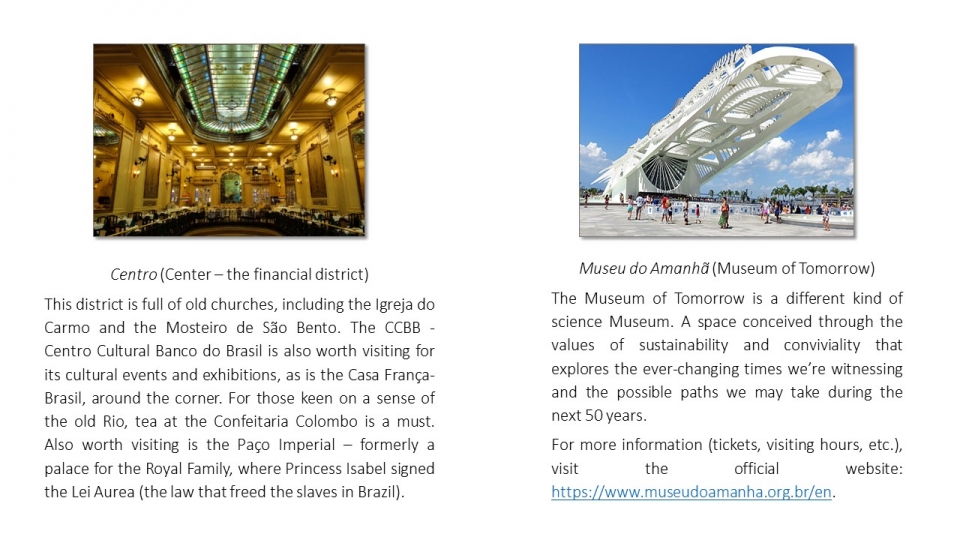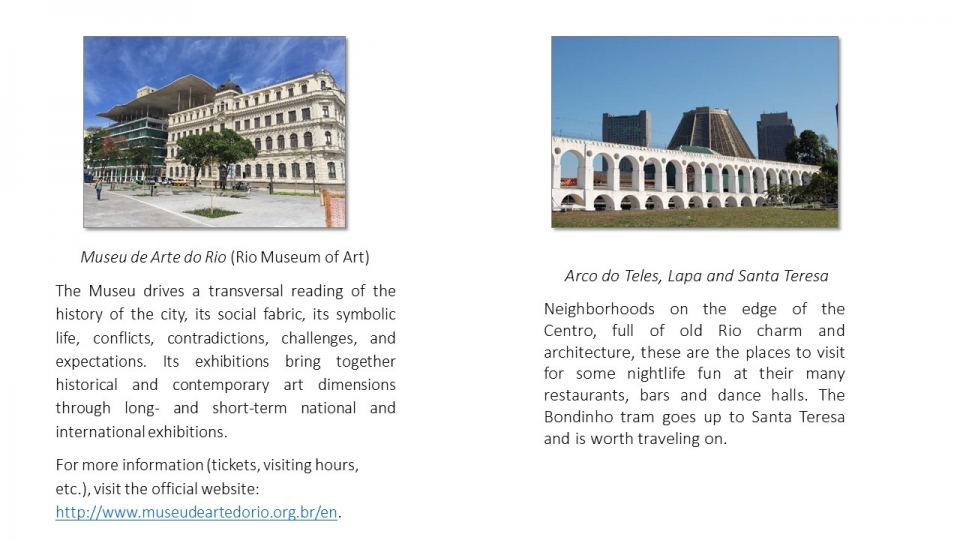Hotel and restaurants
Yoo2 Rio de Janeiro
 View from the Rooftop
View from the Rooftop
Praia de Botafogo, 242 – Botafogo
Phone: +55 21 345 2000
http://www.yoo2.com/riodejaneiro
Yoo2 Rio de Janeiro connects local soul with cutting-edge design. Against an eclectic mix of music that runs throughout the day, you can enjoy creative, regional dining or relax around the Rooftop Pool. The rooms at Yoo2 Rio de Janeiro stand apart with their striking design: they make you feel both a part of and apart from the city. Rio’s colour, patterns and energy are all embedded in the room, but this is also your own space; a retreat from the city in which to relax and refresh.
Yoo2 Rio de Janeiro (English version)
Pistache Restaurant
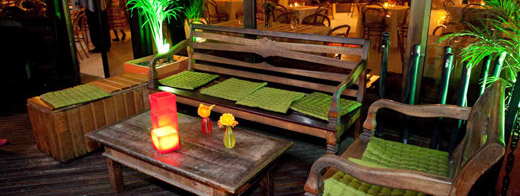
Rua Marquês de Olinda, 11 – Botafogo
Phone: +55 21 2551-4139 | 2551-4203
http://www.restaurantepistache.com.br/
Located walking-distance from FGV, this is a very pleasant restaurant, which caters to executives from nearby companies, such as Shell, Coca-Cola, EY, Repsol and FGV. The restaurant offers a large and varied selection of international and Brazilian dishes in their all-you-can-eat buffet.
Rio Scenarium
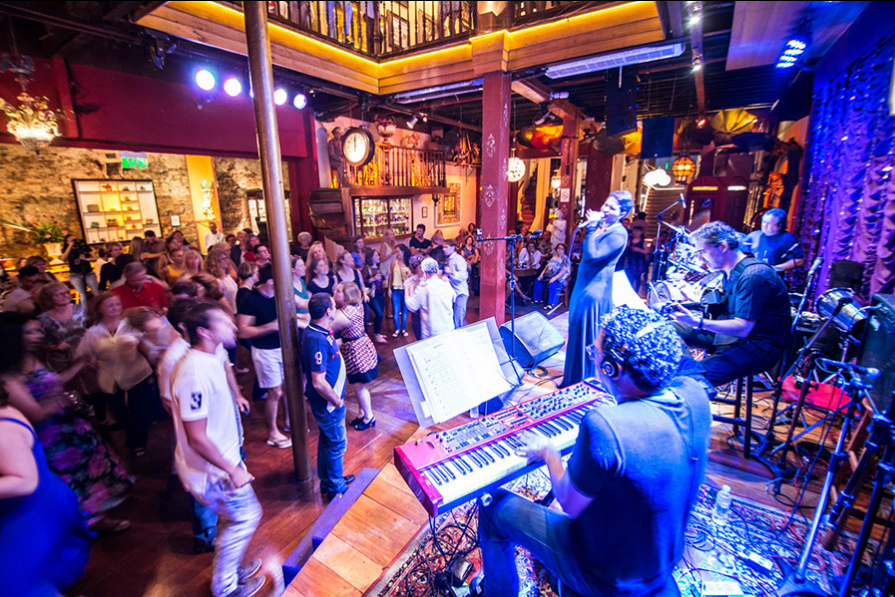
Rua do Lavradio, 20 – Centro
Phone: +55 21 3147 9000 | 3147 9001
http://www.rioscenarium.art.br/
Welcome Dinner
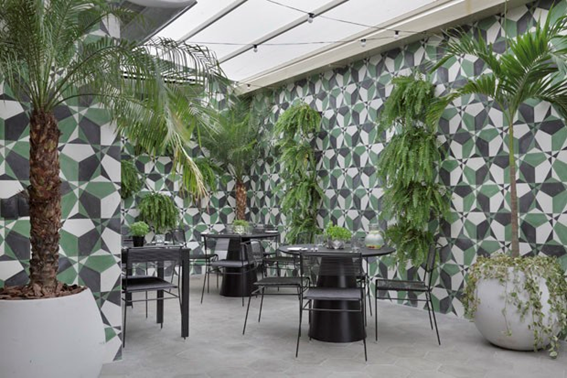
(Copyright Casa Vogue – Globo)
FGV EBAPE will welcome its participants at the ground floor restaurant of the YOO2 hotel. This is a brand-new hotel and its restaurant is run by a young Japanese-Brazilian chef, Kenji, who does wonders with his own, unique take on our cuisine.
Networking Dinner: Fogo de Chão Restaurant
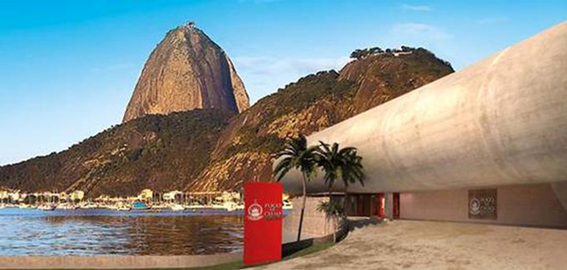
Avenida Repórter Nestor Moreira, s/n – Botafogo
Phone: +55 21 97396-8498
http://www.fogodechao.com.br/
Fogo de Chão is an internationally renowned Brazilian steakhouse, with branches across Brazil and abroad, and the one in Rio de Janeiro is right by the Guanabara Bay, with a privileged view of the Sugar Loaf. The restaurant offers delicious meat on a spit, on an all-you-can-eat basis. Guests (particularly vegans and vegetarians) can also help themselves to a large and excellent array of salads, vegetables, cheeses, sushi and other delicacies.
Farewell Dinner: The View Restaurant
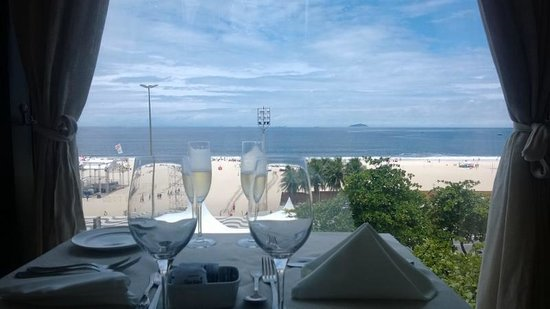
Av. Atlântica, 1020 - Copacabana
Phone: +55 21 2195-7800
Located on the fourth floor of the new Hilton Hotel Copacabana, The View is a pleasant restaurant, open to guests and walk-ins. As the name says, the restaurant offers a privileged view of Copacabana Beach. The food is an all-you-can-eat buffet, with strong emphasis on Brazilian cuisine. The NIBES party will be located on a more reserved space of the salon.
Practical information
Before travelling
Immunization
Although the Brazilian government does not require any specific immunizations for adults coming to Brazil, we recommend that you bring along your immunization record (International Certificates of Vaccination) or other official statement showing which shots you have had, in case of an emergency. The record must show the date of the vaccination and the type of serum used.
Money
Bring credit cards, US Dollars (the most readily exchangeable foreign currency), and, if you wish, some Euros.
Currency
The unit of currency is the “Real” (R$) implemented as from July 1994. Notes in circulation include: 100 reais (R$100), 50 reais (R$50), 20 reais (R$20), 10 reais (R$10), 5 reais (R$5), and 2 reais (R$2). Coins in circulation include: 1 real (R$1), 50 centavos (R$0.50), 25 centavos (R$0.25), 10 centavos (R$0.10) and 5 centavos (R$0.05).
Credit cards
In Rio there is little problem in changing other foreign currencies and there is an extensive network of ATMs. Most major credit cards are accepted in Brazil (VISA – the most widely accepted – and MasterCard; American Express, Diners Club – less accepted.) Your credit card may not work in cash dispensers, but those marked ‘Banco 24 Horas’ will dispense cash against most international cards. Non-ATM cash advances against credit cards are possible (e.g. at some banks), but the process can be complicated.
Please be advised that you might not be able to withdraw cash from an ATM after 10 pm.
Arrival
Immigration
Before landing, passengers are given a form to be completed and handed over to the Brazilian immigration authorities at the international airports. After your passport is stamped, the immigration officer will hand you back the form you have completed. Keep it carefully with your passport, as it may be requested when you leave the country.
Customs
Please refer to the Customs Form, handed in on the plane, for articles that need to be declared at Customs, as well as limit on the amount of currency (cash) you are allowed to bring into the country. Duty Free Shop in Tom Jobim International (“Galeão”) airport in Rio is also open to arriving international travelers. They are well stocked and prices are sometimes lower than in many countries. Passengers in transit will not be allowed to shop.
Exchange
You can exchange currency at the airport, where there are bureaux de change (Casas de Câmbio) with varying opening hours. At Rio de Janeiro’s International airport, there are two places where you can exchange your money:
Get Money
Terminal 1 - Arrivals (ground floor)
Opening hours: 6 am to 12 am (midnight)
Banco Safra
Terminal 1 – International arrivals (ground floor)
Terminal 2 – Ground floor, near the Free Shop and Customs
Terminal 2 – First floor: mezzanine, near food court and Duty Free Shops (to the left of Passport Control)
Terminal 2 – Second floor: between check-in aisles “F” and “G”
Opening hours: 24 hours, seven days a week
ATM’s
Travel ATM (24 hour withdrawal) “Banco 24 Horas”: Terminal 1, ground floor, half-way between domestic and international arrivals;
Bradesco Bank ATM: Terminal 1, second floor, in the Food Court;
Caixa Econômica ATM: Terminal 1, second floor, to the left of the Food Court, near Itaú and Banco do Brasil banks.
Banco 24 Horas, Bradesco, Caixa Economica, Itaú, Santander and HSBC: Terminal 2, ground floor, domestic arrivals;
HSBC: Terminal 2, first floor, near the Food Court.
For further information, check: http://www.riogaleao.com/places-categories/todos-os-servicos/
Hotels can change small amounts of US Dollars into cash and US Dollar Travelers Checks on the spot. They generally give higher rates of exchange and may have little cash at weekends. Better exchange rates are available from banks, but the process can be time-consuming. You will need your passport to exchange money. US$ exchange rates are published daily in the newspapers (commercial and travel rates).
TIP: Obtaining change in Brazil is almost a daily hurdle. Ensure you have a good supply of smaller denomination bills (such as R$2, R$5 and R$10), rather than fifties or hundred. Cab drivers, for instance, very rarely have (or pretend not to) change.
Information on Rio
Personal security advice
Tourist Police (DEAT): (21) 2332-2924 (Av. Afrânio de Melo Franco, 159 – Leblon)
Police: 190
Ambulance:192
Fire: 193
Levels of crime and violence can be high, especially in major cities; therefore, you should be vigilant, especially when going out after dark. Nevertheless, you may take comfort in the knowledge that the vast majority of visits in Rio de Janeiro take place without incidents. Below are suggestions of some precautions you should take during your stay:
1. Avoid carrying large quantities of cash and valuable objects (expensive cameras, etc.).
2. Brazilian law requires that everyone carry identification at all times. It is advisable not to carry your original passport with you, but, rather, have a copy of the main pages (number, identification and visa, if any). If possible, carry some form of photo ID, like a Driver’s License.
3. Beware of pickpockets, particularly on public transport and on beaches. Never leave personal belongings unattended.
Electricity: In Rio voltage is usually 110 volts, AC at 60 cycles. Plugs are normally two pin, fat or round, or three-pin (round). Most hotels and flats have dual voltage sockets for electric shavers. If you are bringing a laptop computer, the telephone jack is of the American type. Check before you plug.
Climate: Annual average: 16oC-25oC. Winter: 5oC-20oC, Summer: 30oC-35 oC. The weather is mostly hot and humid in Rio, especially in the summer (November-February), and during this season, you should expect summer thunderstorms, which can leave some streets knee-high in water.
Clothing: For meetings, exhibitions, cocktail parties, a smart suit (matching outfit for women) is normal, especially in business circles. Please note that you will be visiting companies; therefore, business suit (equivalent for women) will be expected.
On other occasions, clothing is relaxed. The seasons in Brazil are the opposite of those in the Northern Hemisphere. In Rio, it can be hot any time of the year, though most people stick to smart business attire for business and formal events, despite a degree of discomfort.
Climate: Annual average: 16oC-25oC. Winter: 5oC-20oC, Summer: 30oC-35 oC. The weather is mostly hot and humid in Rio, especially in the summer (November-February), and during this season, you should expect summer thunderstorms, which can leave some streets knee-high in water.
ENSURE YOU WEAR SUNCREEN DURING THE DAY. TIP: We recommend you bring sunscreen from home, as it is quite expensive in Brazil.
Water: Tap water is not to be drunk in Brazil. The safest is to drink mineral water. There is no need, however, to use mineral water for personal wash and tooth brushing. If preparing raw fruit, salad, vegetables at home, be sure to wash them thoroughly and soak them in a solution of hypochlorite and water (about 10 drops to a liter of water).
Tipping: Waiters’ tips are usually included in the bill (it is shown as “service charge”, usually of 10%). When not included in the bill, recommended tips range from 10% to 15%. It is also customary to tip other attendants such as doormen, car park valets, supermarket hands etc. A tip of R$ 5 is fine.
Social etiquette: Brazilians are generally friendly and relaxed. You may be expected to shake hands every time you meet or take leave of a Brazilian (even if you have met the person previously the same day). Among women, it is normal to exchange kisses on the cheek (but not a rule). Back-slapping (men) and hugging (women) between friends and acquaintances is commonplace.
Public telephones: you can make local, inter-city and international calls by buying telephone cards at the airport, from bars or some newspaper stands.
For instance, to call from Rio de Janeiro to the US: 00 21 + 1 (country code) + area code + telephone number. To call from Rio de Janeiro to other cities in Brazil = 0 + 31 (local carrier) or 0 + 21 (local carrier) + city area code + telephone number. The area code for Rio is 21.
Health Insurance: foreign travelers should acquire health insurance before traveling to Brazil. Travel agencies can advise the most suitable insurance company for your situation. If you require medical treatment or prescription medication, most likely you will be asked to first pay and then claim back from your insurance company. Most hospitals accept credit cards.
Taxis: one of the best ways for foreigners to get around Rio is by taxi. Taxis in the city centers are plentiful and you can stop the regular taxis (yellow cars) on the streets, find them at the taxi ranks, or book them by phone.
There are many taxi companies mobile phone apps which make it easier and safer to get a cab to get around in Rio, the most used ones are “Easy Taxi” and “99 Taxis”; the mobile apps allow you to choose method of payment and to see which car is picking you up. An alternative to taxis is Uber, which is increasingly gaining ground in Rio’s market and offers good service with cheaper rates.
If you’re not being collected at the airport, we recommend that you take a pre-paid airport taxi. It is safest to travel by a pre-paid airport taxi rather than a metered common taxi.

The regular taxi kiosks are located across the hall, as you exit customs and enter the ARRIVALS lounge. There are a number of cooperative taxis, which charge high fares, but if you opt for either AEROTAXI or AEROCOOP, then their tariffs are more reasonable (they are the regular taxis that are permitted to operate at the Galeão airport). You can pay a flat rate at the kiosk and with the voucher proceed to the taxi rank. A trip to FLAMENGO will cost R$54 (Bandeira 1) or R$63 (Bandeira 2).
“Bandeira” or “Bandeirada” are taxi fare regimes, which change depending on whether it is after a certain hour of the night or a particular holiday. Bandeira 2 is in place between 6 am and 9 pm, Monday to Saturday, all day Sunday, as well as during public holidays, or as otherwise determined by City Hall. Be prepared to pay extra for pieces of luggage (R$2.30 per piece) carried in the trunk of the car. It is not advisable to use the shared airport limousine minibus services.
Subway/Underground System: the subway system in Rio is good, cheap, safe, clean and quick, but it does not cover much of the city, as it is relatively small. The subway operates from 5:00 to Midnight from Monday to Saturday, and from 7:00 to 23:00 on Sundays and public holidays. You may buy the tickets at the ticket kiosks inside the stations from 5:00 to 22:00.
Buses: you can go anywhere by bus within the city, but make sure you know what bus number you need beforehand. Although they are generally safe during the day, they should be avoided late at night. Understanding the city bus routes is easy but a good city map will help.
